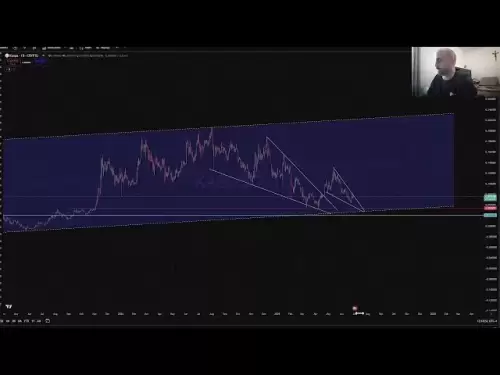-
 Bitcoin
Bitcoin $107,341.7259
0.15% -
 Ethereum
Ethereum $2,438.6204
0.70% -
 Tether USDt
Tether USDt $1.0003
-0.02% -
 XRP
XRP $2.1866
1.94% -
 BNB
BNB $649.0952
0.36% -
 Solana
Solana $150.9602
5.63% -
 USDC
USDC $0.9999
0.00% -
 TRON
TRON $0.2742
0.40% -
 Dogecoin
Dogecoin $0.1645
1.93% -
 Cardano
Cardano $0.5669
1.18% -
 Hyperliquid
Hyperliquid $37.8286
4.19% -
 Bitcoin Cash
Bitcoin Cash $491.4669
-2.74% -
 Sui
Sui $2.8150
3.06% -
 Chainlink
Chainlink $13.4184
2.91% -
 UNUS SED LEO
UNUS SED LEO $9.0809
0.27% -
 Avalanche
Avalanche $18.0295
2.60% -
 Stellar
Stellar $0.2396
1.19% -
 Toncoin
Toncoin $2.8587
0.13% -
 Shiba Inu
Shiba Inu $0.0...01160
2.59% -
 Litecoin
Litecoin $86.4192
1.45% -
 Hedera
Hedera $0.1486
1.19% -
 Monero
Monero $308.4324
0.87% -
 Polkadot
Polkadot $3.4202
1.43% -
 Bitget Token
Bitget Token $4.6436
-0.34% -
 Dai
Dai $0.9998
-0.02% -
 Ethena USDe
Ethena USDe $1.0002
0.00% -
 Uniswap
Uniswap $7.1527
3.29% -
 Pi
Pi $0.5357
-8.45% -
 Pepe
Pepe $0.0...09588
4.61% -
 Aave
Aave $259.9759
0.81%
How to set the gas fee in Bybit Wallet?
Bybit Wallet simplifies gas fee setting with preset options like "Slow," "Average," and "Fast," helping users manage transaction costs based on network congestion.
Apr 01, 2025 at 11:42 pm
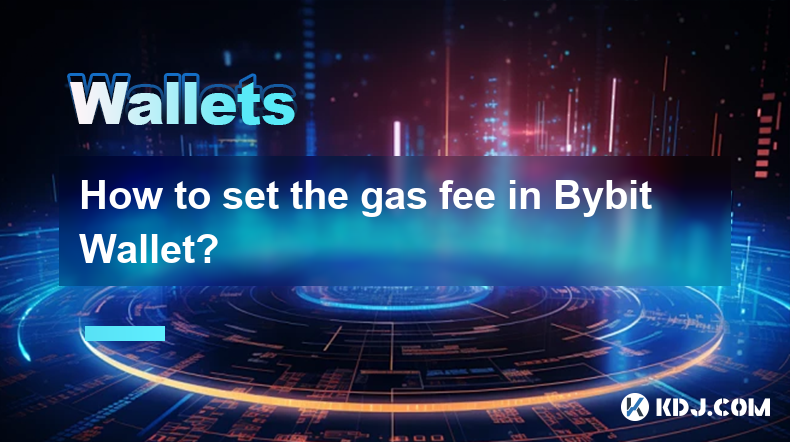
Understanding Gas Fees in Bybit Wallet
Bybit Wallet, like other Ethereum-based wallets, requires gas fees to process transactions. These fees compensate miners for verifying and adding your transaction to the blockchain. The amount of gas you need depends on the complexity of your transaction; sending ETH requires less gas than interacting with a complex DeFi application. Understanding gas fees is crucial to avoid unexpected costs or transaction failures. Gas is measured in Gwei, a unit of ETH. Higher Gwei values mean higher transaction fees, leading to faster processing times.
Setting the Gas Fee: A Step-by-Step Guide
Bybit Wallet doesn't directly allow you to manually set a precise Gwei value like some other wallets. Instead, it offers a simplified approach. The platform provides suggested gas fee options based on network congestion. This dynamic adjustment helps ensure your transaction gets processed within a reasonable timeframe. You don't have direct control over the specific Gwei amount, but you can choose from preset options.
Step 1: Initiate a Transaction: Begin the process of sending cryptocurrency or interacting with a decentralized application (DApp) within the Bybit Wallet.
Step 2: Review the Gas Fee Options: Before confirming the transaction, Bybit Wallet will display several gas fee options. These options are usually categorized as "Slow," "Average," and "Fast."
Step 3: Select Your Preferred Speed: Choose the gas fee option that best suits your needs. A "Slow" option will be cheaper but take longer to process. A "Fast" option will cost more but ensure quicker confirmation. The "Average" option provides a balance between speed and cost.
Step 4: Confirm the Transaction: Once you've selected your preferred gas fee option, review all transaction details carefully, including the total cost including the gas fee. Then, confirm the transaction to proceed.
Step 5: Monitor the Transaction: After confirmation, you can monitor the transaction status within the Bybit Wallet. The transaction's progress and confirmation time will depend on the chosen gas fee option and network conditions.
Factors Affecting Gas Fees
Several factors influence the gas fees you'll encounter in Bybit Wallet. Network congestion is a primary driver. When the Ethereum network is busy, gas fees tend to be higher. The complexity of your transaction also plays a role; more complex interactions require more gas. Finally, the time of day can affect fees; peak hours often see higher demand and thus higher gas prices.
Understanding Gwei and its Relation to Gas Fees
Gwei is a unit of ETH. One ETH equals 1 billion Gwei (10^9 Gwei). When setting gas fees, you're essentially specifying the price you're willing to pay per unit of gas. Higher Gwei values mean higher gas fees, resulting in faster transaction processing. Conversely, lower Gwei values lead to lower fees but slower confirmation times. Bybit Wallet's simplified approach abstracts away the direct Gwei manipulation, making it user-friendly.
Gas Fee Optimization Strategies
While Bybit Wallet doesn't offer granular control, you can still optimize your gas fees. Choosing the "Average" or "Slow" options during periods of low network congestion can significantly reduce costs. Avoid peak hours when possible, as transaction demand is usually highest then. If your transaction isn't time-sensitive, opting for a slower confirmation will save you money.
What if my transaction fails?
If your transaction fails, it's usually due to insufficient gas. Bybit Wallet will usually display an error message explaining the reason for failure. You may need to try again with a higher gas fee option. Alternatively, check the network status to ensure there are no major issues affecting transactions. In rare cases, a bug or issue with the smart contract you're interacting with could be the culprit.
Can I change the gas fee after initiating a transaction?
No, once you've initiated a transaction and selected a gas fee in Bybit Wallet, you cannot change it. This is a standard practice across most crypto wallets to maintain transaction integrity and prevent manipulation. Always double-check your transaction details before confirmation.
What happens to the unused gas?
Any unused gas is automatically refunded to your Bybit Wallet. The amount refunded depends on the difference between the gas you paid for and the gas actually consumed by the transaction. This refund is usually automatic and you don't need to take any further action.
Why are gas fees so high sometimes?
High gas fees are primarily due to network congestion. When many users are simultaneously making transactions on the Ethereum network, the demand for processing power increases, driving up the price of gas. This is a common characteristic of decentralized blockchains and not specific to Bybit Wallet.
Is there a way to predict gas fees?
Predicting gas fees with absolute accuracy is difficult due to the dynamic nature of the Ethereum network. However, various websites and tools provide real-time gas fee estimates. These estimates can help you make informed decisions about when to execute your transactions to potentially minimize costs. However, remember that these are only estimations, and actual fees might vary slightly.
Common Questions and Answers
Q: What is Gwei?
A: Gwei is a smaller unit of Ether (ETH), used to measure gas fees on the Ethereum network. 1 ETH = 1,000,000,000 Gwei.
Q: Why are gas fees necessary?
A: Gas fees incentivize miners to process transactions and secure the Ethereum network.
Q: Can I avoid gas fees entirely?
A: No, gas fees are inherent to the Ethereum blockchain's functionality.
Q: How can I reduce gas fees?
A: Choose slower transaction speeds when possible, and avoid peak network congestion times.
Q: What if my transaction fails due to insufficient gas?
A: You'll need to try again with a higher gas fee. Check for network issues as well.
Q: Where can I find more information about gas fees?
A: Consult the Bybit Wallet help center or explore resources dedicated to Ethereum gas fees online.
Disclaimer:info@kdj.com
The information provided is not trading advice. kdj.com does not assume any responsibility for any investments made based on the information provided in this article. Cryptocurrencies are highly volatile and it is highly recommended that you invest with caution after thorough research!
If you believe that the content used on this website infringes your copyright, please contact us immediately (info@kdj.com) and we will delete it promptly.
- XRP, Ripple, and Bitcoin: Decoding the Latest Crypto Moves
- 2025-06-29 08:30:13
- NBA Legend Scottie Pippen's Crypto Picks: SHIB and XRP in the Spotlight
- 2025-06-29 08:50:12
- Bitcoin, US Strategy, and Cryptocurrency Regulation: Navigating the Digital Frontier
- 2025-06-29 09:10:13
- Chainlink's $17 Breakout: Bullish Momentum Fueled by Mastercard Partnership
- 2025-06-29 08:30:13
- Crypto Launches Q3 2025: Top Picks to Watch
- 2025-06-29 09:10:13
- BTC Bull Token: Riding Bitcoin's Bull Run to Crypto Glory
- 2025-06-29 09:30:11
Related knowledge
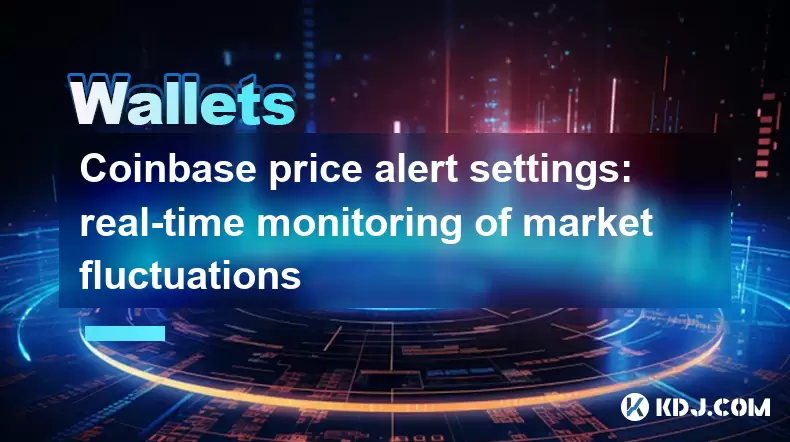
Coinbase price alert settings: real-time monitoring of market fluctuations
Jun 29,2025 at 07:00am
Setting Up Coinbase Price AlertsTo begin real-time monitoring of market fluctuations on Coinbase, users can utilize the built-in price alert feature. This function allows you to receive notifications when a cryptocurrency reaches a specific price point. To access this setting, open the Coinbase app or log in via the web platform. Navigate to the 'Prices...

How to stake cryptocurrencies on Coinbase? Benefits and risks
Jun 27,2025 at 06:36pm
Understanding Cryptocurrency Staking on CoinbaseStaking cryptocurrencies involves locking up digital assets to support the operations of a blockchain network, typically in return for rewards. Coinbase, one of the most popular cryptocurrency exchanges globally, offers staking services for several proof-of-stake (PoS) coins. Users can stake their holdings...
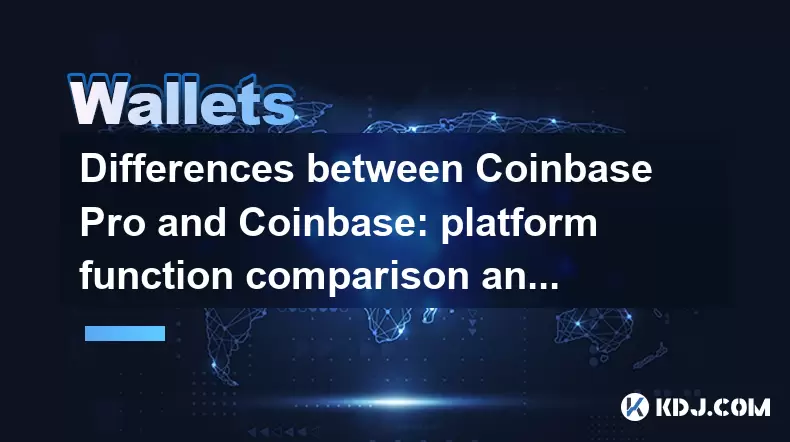
Differences between Coinbase Pro and Coinbase: platform function comparison and analysis
Jun 29,2025 at 08:21am
Overview of Coinbase and Coinbase ProWhen exploring the cryptocurrency trading landscape, users often encounter two platforms under the same parent company: Coinbase and Coinbase Pro. While both are operated by the same organization, they cater to different types of users and offer varying features. Coinbase is primarily designed for beginners and casua...

How to contact Coinbase customer service? Support channels and response times
Jun 28,2025 at 01:29pm
Contacting Coinbase Customer Service: Support Channels and Response TimesIf you're a user of Coinbase, reaching their customer service team may become necessary for various reasons, such as account verification issues, transaction disputes, or technical difficulties. Understanding the different support channels available and what to expect in terms of r...

Coinbase advanced trading function usage tutorial: limit orders and market orders
Jun 28,2025 at 09:07pm
Understanding the Difference Between Limit Orders and Market OrdersWhen using Coinbase's advanced trading features, it is crucial to understand the fundamental difference between limit orders and market orders. A market order executes immediately at the best available price on the market. This type of order ensures that your trade goes through quickly, ...
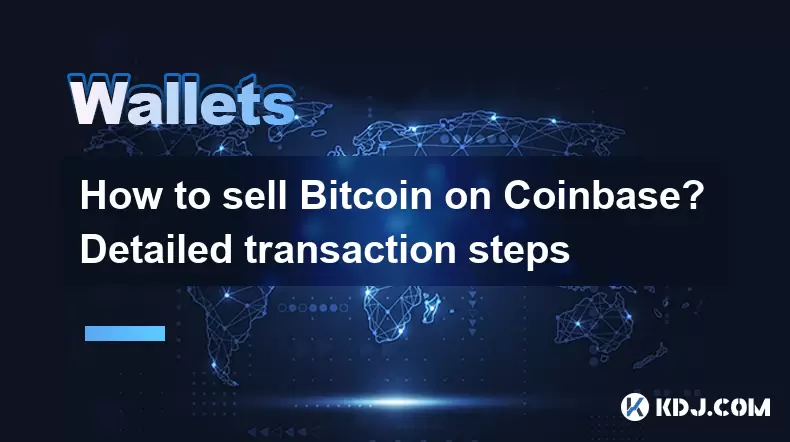
How to sell Bitcoin on Coinbase? Detailed transaction steps
Jun 29,2025 at 04:22am
Setting Up Your Coinbase Account for TransactionsBefore you can sell Bitcoin on Coinbase, you must ensure your account is fully set up and verified. Coinbase requires identity verification to comply with regulatory standards. This process involves uploading a government-issued ID, confirming your address, and sometimes submitting a selfie holding the ID...

Coinbase price alert settings: real-time monitoring of market fluctuations
Jun 29,2025 at 07:00am
Setting Up Coinbase Price AlertsTo begin real-time monitoring of market fluctuations on Coinbase, users can utilize the built-in price alert feature. This function allows you to receive notifications when a cryptocurrency reaches a specific price point. To access this setting, open the Coinbase app or log in via the web platform. Navigate to the 'Prices...

How to stake cryptocurrencies on Coinbase? Benefits and risks
Jun 27,2025 at 06:36pm
Understanding Cryptocurrency Staking on CoinbaseStaking cryptocurrencies involves locking up digital assets to support the operations of a blockchain network, typically in return for rewards. Coinbase, one of the most popular cryptocurrency exchanges globally, offers staking services for several proof-of-stake (PoS) coins. Users can stake their holdings...

Differences between Coinbase Pro and Coinbase: platform function comparison and analysis
Jun 29,2025 at 08:21am
Overview of Coinbase and Coinbase ProWhen exploring the cryptocurrency trading landscape, users often encounter two platforms under the same parent company: Coinbase and Coinbase Pro. While both are operated by the same organization, they cater to different types of users and offer varying features. Coinbase is primarily designed for beginners and casua...

How to contact Coinbase customer service? Support channels and response times
Jun 28,2025 at 01:29pm
Contacting Coinbase Customer Service: Support Channels and Response TimesIf you're a user of Coinbase, reaching their customer service team may become necessary for various reasons, such as account verification issues, transaction disputes, or technical difficulties. Understanding the different support channels available and what to expect in terms of r...

Coinbase advanced trading function usage tutorial: limit orders and market orders
Jun 28,2025 at 09:07pm
Understanding the Difference Between Limit Orders and Market OrdersWhen using Coinbase's advanced trading features, it is crucial to understand the fundamental difference between limit orders and market orders. A market order executes immediately at the best available price on the market. This type of order ensures that your trade goes through quickly, ...

How to sell Bitcoin on Coinbase? Detailed transaction steps
Jun 29,2025 at 04:22am
Setting Up Your Coinbase Account for TransactionsBefore you can sell Bitcoin on Coinbase, you must ensure your account is fully set up and verified. Coinbase requires identity verification to comply with regulatory standards. This process involves uploading a government-issued ID, confirming your address, and sometimes submitting a selfie holding the ID...
See all articles























